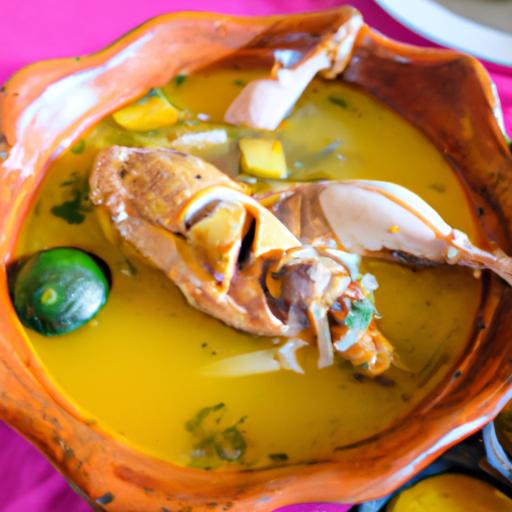
Discover the fascinating world of iguana soup with our article on interesting facts about iguana soup. Explore its cultural significance, nutritional value, and more!
Iguana soup is more than just a delicacy in the Latin American and Caribbean regions. It is a culinary tradition that holds deep cultural significance. This exotic soup, made from the meat of iguanas, has been enjoyed by adventurous eaters for centuries. In this article, we will take a closer look at iguana soup, delving into its history, nutritional value, environmental impact, and even its role in popular culture. Get ready to dive into the fascinating world of iguana soup!
History of Iguana Soup
Origins of Iguana Soup in Latin American and Caribbean Cultures
Iguana soup has its roots firmly planted in the Latin American and Caribbean cultures. Indigenous communities in these regions have been consuming iguana meat for centuries, recognizing it as a readily available source of protein. As time passed, the preparation methods for iguana soup evolved, resulting in a unique culinary experience.
Traditional Methods of Preparing Iguana Soup
In Latin American and Caribbean cultures, iguana soup is prepared using time-honored cooking techniques that have been handed down from one generation to the next. The process begins with meticulously skinning and cleaning the iguana. Then, the meat is chopped into small pieces and boiled in a large pot along with an assortment of vegetables and spices. The soup is allowed to simmer for hours, allowing the flavors to meld perfectly and the meat to become tender.
Cultural Significance of Iguana Soup in Certain Communities
Iguana soup goes beyond being just a meal in Latin American and Caribbean cultures; it represents cultural heritage. In some communities, this soup is reserved for special occasions such as weddings, festivals, and other celebrations. It serves as a way to honor the traditions of ancestors while passing them on to future generations. The cultural significance of iguana soup has even spread beyond these communities, with adventurous eaters seeking it out as a unique culinary experience.
Nutritional Value of Iguana Soup
Iguana meat is not only delicious but also incredibly nutritious. It is packed with essential proteins, vitamins, and minerals. Let’s take a closer look at the nutritional benefits of iguana meat.
Nutritional Benefits of Iguana Meat
Iguana meat is a rich source of protein, which is crucial for building and repairing tissues in the body. It also contains vitamins and minerals like vitamin B6, vitamin C, iron, and potassium.
Comparison of Iguana Meat to Other Commonly Consumed Meats
Compared to other commonly consumed meats, iguana meat is low in fat and calories. For instance, a 3.5-ounce serving of iguana meat contains only 2 grams of fat and 78 calories, while the same serving size of beef contains 18 grams of fat and 250 calories. Additionally, iguana meat is lower in cholesterol, making it a heart-healthy choice.
Health Benefits and Potential Drawbacks of Consuming Iguana Meat
While iguana meat offers numerous health benefits, there are potential drawbacks to consider. Iguanas are known carriers of salmonella bacteria, which can cause food poisoning. Hence, it is crucial to ensure that iguana meat is cooked thoroughly to eliminate any bacteria that may be present. Furthermore, some individuals may have an allergic reaction to iguana meat, so caution must be exercised when trying it for the first time.
In summary, iguana meat is a nutritious and healthy choice, being low in fat and calories. Although it carries potential risks, proper precautions can mitigate them. If you’re looking for a new and exciting culinary adventure, iguana soup should definitely be on your list!
The Environmental Impact of Iguana Soup
The hunting and consumption of iguanas have a significant impact on the environment. While iguanas are not an endangered species, their populations have been affected by over-hunting and habitat loss. The demand for iguana meat has led to unsustainable hunting practices, resulting in a decline in iguana populations.
Impact of Iguana Hunting and Consumption on the Environment
Iguanas play a vital role in the ecosystem by regulating populations of insects and other small animals. Over-hunting has disturbed this balance, leading to an increase in pests and other unwanted species in some areas. Additionally, iguanas also contribute to seed dispersal, and their decline may negatively impact plant species that rely on them for pollination.
Sustainability of Iguana Meat as a Food Source
Despite the environmental impact of iguana hunting, the meat remains popular in many parts of the world. However, concerns have been raised about the sustainability of this practice. Some experts argue that iguana meat cannot be considered a sustainable food source due to its impact on iguana populations and their habitat. Others suggest that, with proper management, iguana hunting can be sustainable.
Efforts to Regulate Iguana Hunting and Protect Endangered Species
To address the environmental impact of iguana hunting, certain countries have implemented measures to regulate hunting and protect endangered species. For instance, Mexico has made it illegal to hunt iguanas under federal law. Other countries have also introduced quotas and regulations to limit the number of iguanas that can be hunted.
In conclusion, the environmental impact of iguana hunting and consumption is a complex issue that requires careful consideration. While iguana meat holds cultural significance, it is essential to strike a balance between preserving cultural traditions and protecting the environment.
Iguana Soup in Popular Culture
Iguana soup has found its way into popular culture in various forms. From its mentions in literature to its appearances in film and television, iguana soup stands as a cultural symbol and delicacy. Let’s explore the different ways in which iguana soup has been portrayed in popular culture.
Depictions of Iguana Soup in Literature, Film, and Television
Iguana soup has been mentioned in literary works such as Ernest Hemingway’s “The Old Man and the Sea” and Paul Therou’s “The Mosquito Coast,” where it is described as a local dish enjoyed by the characters. In the world of film and television, shows like “Anthony Bourdain: No Reservations” and “Bizarre Foods with Andrew Zimmern” have showcased the adventurous nature of iguana soup and highlighted its cultural significance in Latin American and Caribbean communities.
Use of Iguana Soup in Traditional Medicine and Folklore
Traditionally, iguana soup has also been used in traditional medicine and folklore. In certain cultures, it is believed to possess healing properties, effectively curing various ailments. Moreover, iguanas have played a role in traditional rituals and ceremonies.
Popularity of Iguana Soup in the Culinary World and Among Adventurous Eaters
In recent years, iguana soup has gained popularity among adventurous eaters and food enthusiasts. Some restaurants in the United States and other parts of the world have started including iguana soup on their menus, catering to those seeking unique dining experiences.
Despite the controversy surrounding iguana soup, its cultural significance and distinct flavor have made it a sought-after dish in specific communities and a subject of fascination in popular culture.
Conclusion
Iguana soup is more than just a meal; it is a symbol of cultural heritage and a source of sustenance for many communities. We have explored the history of iguana soup, its traditional preparation methods, and its nutritional value. Additionally, we have examined the environmental impact of iguana hunting and its sustainability as a food source. Furthermore, we have discussed the role of iguana soup in popular culture, from its appearance in literature, film, and television to its use in traditional medicine and folklore.
As evident through our journey, iguana soup has a rich and complex history deeply intertwined with the cultural traditions of Latin American and Caribbean communities. While it may not be everyone’s cup of tea, it remains an essential part of the culinary heritage of these regions and is enjoyed by adventurous eaters worldwide.
To discover more about iguanas and their role in our world, visit iguanafacts.com. There, you’ll find an array of articles and resources dedicated to these fascinating creatures.




